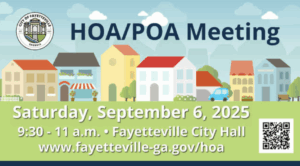Fayetteville wants a TAD more — tax money, that is, for three redevelopment projects.
Members of the Fayetteville City Council at the Jan. 7 meeting will consider a resolution asking for the passage of local legislation that will lead to a referendum which, if approved by voters, would give the city redevelopment powers needed to move ahead with Tax Allocation District (TAD) projects identified last year.
Specific TAD projects also require approval of the Fayette County Commission and the Fayette County School Board.
City Manager Joe Morton in a Dec. 23 letter said state Rep. Matt Ramsey had agreed to introduce the local legislation. Once accomplished, the referendum could be held later this year in July, September or November.
The city last year was awarded a Livable Centers Initiative grant by the Atlanta Regional Commission to develop strategies that assist with proposed TAD development projects.
At its core, a TAD is a redevelopment tool that requires voter approval. A qualifying TAD area must be either blighted or distressed, deteriorating or one with inadequate infrastructure. The council in meetings last year identified three such commercial areas that could benefit from redevelopment activities.
Those areas included the 692 Shopping Center on North Glynn Street, the Fayette Place Shopping Center on North Glynn and, potentially, the under-utilized area — all vacant land — of the Market Place at Lafayette that is a part of the Villages at Lafayette master plan.
The 692 center is the strip behind Waffle House and includes the Longbranch Restaurant. Fayette Place includes La Hacienda restaurant, Fayette Sports and Wings & Things and Fayette Community Church.
Financing for a TAD comes as the tax base for the project area is frozen to form a base valuation, with property taxes used to pay eligible infrastructure-affiliated redevelopment costs. Bonds may also be issued to help finance projects. Subsequent annual tax revenues in the project area are used to fund the city’s portion of the redevelopment.
Specific TAD projects must also gain approval from the county commission and school board since the property tax revenues generated in the TAD project area would stay there to help defray the costs of the infrastructure and other improvements designated in the project document.
Essentially, a TAD is not a new tax but rather a diversion of existing taxes in a specific geographic area to be used for redevelopment purposes. TAD property taxes can also be used to pay on any public or private bond that might be associated with the TAD project.
Georgia’s most visible example of a Tax Allocation District project is Atlantic Station near downtown Atlanta.












Leave a Comment
You must be logged in to post a comment.